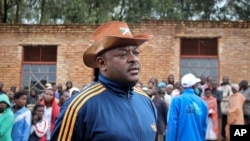Burundi's president announced Thursday he will not run for another term, even as he put in place a new constitution that would allow him to stay in power until 2034.
Speaking in the Kirundi language, President Pierre Nkurunziza told supporters: "We assure Burundians and the international community. Our term will end in 2020. This constitution was not modified to favor President Nkurunziza, as the enemies of the country spread recently. I swear and am really ready, with all my heart, with all my mind and with all my strength, to support the new president we will elect in 2020."
He added: "A man can change his position in the bed, but he cannot change his word."
Deadly political violence and a failed coup attempt followed Nkurunziza's decision in 2015 to pursue a third term, which critics called unconstitutional. More than 1,200 people were killed and hundreds of thousands fled the country, and last year International Criminal Court judges authorized an investigation into allegations of state-sponsored crimes.
More than 73 percent of Burundi's 4.7 million voters in a referendum last month approved changes to the constitution, promoted by Nkurunziza, which extended the length of the president's term from five years to seven. That could allow the 54-year-old Nkurunziza, in power since 2005, another 14 years when his current term expires in 2020.
Opposition activists called the referendum another effort by the president to cling to power, part of a trend by a number of African leaders changing laws to eliminate or loosen term or age limits.
The opposition also alleged intimidation and harassment of people who didn't support the amendments ahead of the May 17 vote, including threats of drowning and castration. A presidential decree criminalized calls to abstain from voting, with a penalty of up to three years in jail.
Key opposition figures in the East African country could not immediately be reached for comment Thursday.
The government rejects allegations of abuses, calling them propaganda by exiles.









